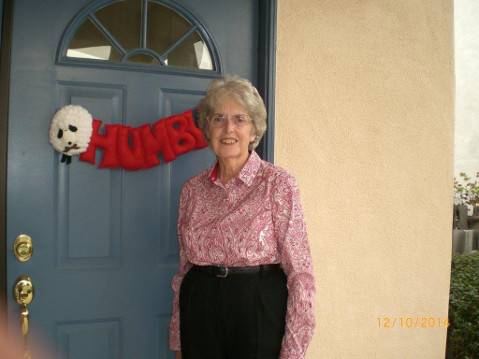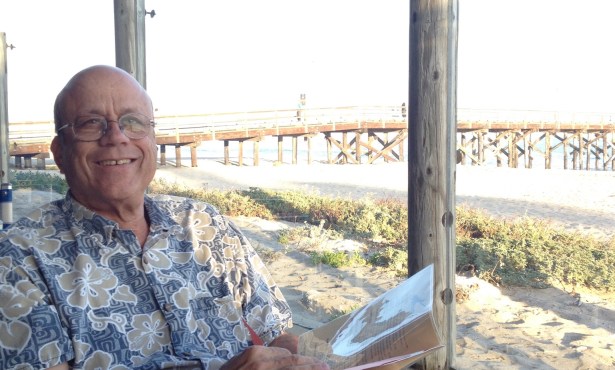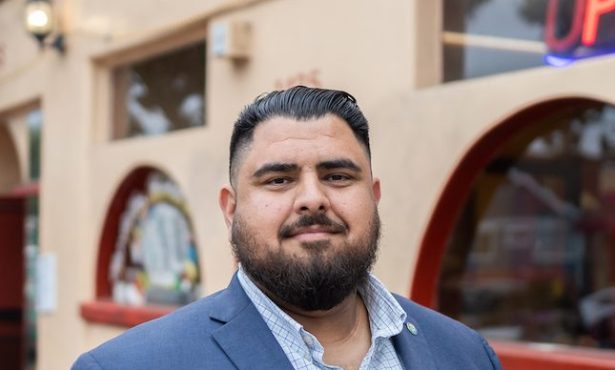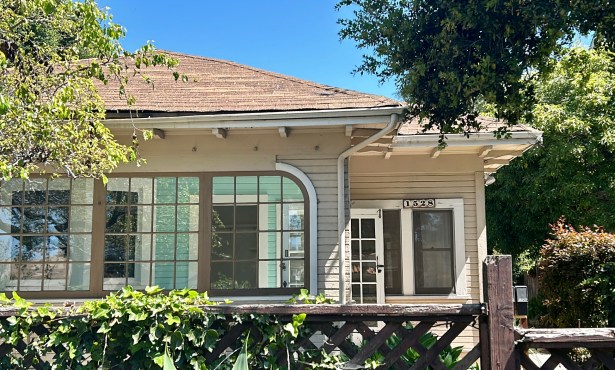Barbara Massey: Goleta Gadfly
Among the Many Who Work to Improve Their City

If you have attended public meetings of the Goleta City Council or watched the televised versions, you may already be familiar with the name of Barbara Massey. Slender, with lightly tinted glasses and a full head of silver gray hair, she presents at first glance a soft and innocent appearance.

However, when she speaks to the five councilmembers in either public comment or on a specific agenda item, any softness dissolves into a factual recitation of how misguided she thinks the proposed action would be. Seven years ago when a prodevelopment council majority “tweaked” (their term) the city’s General Plan, Massey and others condemned proposed changes in standards for creeks, trees, wetlands, and other sensitive habitats:
“This is not what the community of Goleta wants,” she advised the 2009 council. “It is far less protection, with a reduction in buffers for creeks and other sensitive habitat, than is in place now. We wish you would stop wasting our [tax] dollars on this.”
Her criticism was grounded in the months of grassroots discussion and debate that led to the original General Plan in 2006, the culmination of a three-year process of more than 50 meetings and workshops with numerous Goleta participants. The General Plan was supposed to be the city’s “constitution.” Unfortunately, it takes only three councilmembers to agree to change the city’s founding document.
When traditional pro-growth interests gained control of the council, this power was exercised on behalf of serving developers instead of the people, Massey said. Years of recession and a series of uncontested city elections, plus shifts in city staff, strengthened this trend. Most of the opposition to massive development fell to environmental groups and individual activists. While far from the only voice of moderation, Massey’s was one of the most persistent, even when her arguments were often on the losing end of 4-1 votes.
She learned to be tactically adaptable. When the owner of two McDonalds outlets in Goleta wanted to add a drive-through lane in the Camino Real Marketplace (the Old Town site already had one), Massey lost that fight before the Planning Commission. However, she encouraged the Goodland Coalition, of which she is a member, to appeal this decision to the council and won the final round.
Last year she joined the Westside Goleta Coalition steering committee to successfully alter the state’s decision to locate a new CHP station near Ellwood School and among residential neighborhoods. Coalition founder Robert K. Miller recruited Massey for the fight after the city government failed to act. New to Goleta and a property owner in The Hideaway development, he first asked the developers about candidates for the Coalition.
They suggested Massey, who had vigorously opposed The Hideaway during most of its 15-year odyssey.”That was interesting,” chuckles Miller. “They thought she was effective because she was such a difficult opponent.”
He soon realized the developers had pointed out an important ally. “During the CHP fight,” Miller said, “I quickly learned to value her tactical and strategic advice.”
Barbara Massey’s insights and suggestions stem from more than 45 years of civic activism — mostly land use planning — in small and large cities in Oregon and California. She accompanied her husband, engineer and professor Gail Massey, to Goleta from San Diego in 1999 and shortly thereafter was elected president of their homeowners association. While not part of the original Goleta Now! cityhood movement, there she discovered friends and a shared commitment to community betterment.
“You can’t just sit back and complain [about a problem],” she says. “You have to act.” Massey credits her grandfather’s civic roles in her hometown of Connellsville, Pennsylvania, for molding her activist philosophy. Charles Mitchell was mayor of the city and showed her that one person can make a difference, something she’s seen repeatedly over her career.
Her contributions have been acknowledged. Toiling on behalf of public parks and trails in San Diego led to being named 1991 Woman of the Year for the 39th Senatorial District. While living in Goleta she has been appointed to commissions by the county and city, including service for the Air Pollution Control District, the city’s Design Review Board, and, currently, the Public Tree Advisory Commission. Lately she has split her time between public and private sectors. Much of her energy is now devoted to nongovernmental civic groups, such as the Citizens Planning Association, the League of Women Voters, and the Goodland and Westside Goleta coalitions previously mentioned.
She admits to frustration with the direction and pace of development in the City of Goleta and the evidence of public apathy about it. “Many people care about [the future of] Goleta,” she says, “but it’s sad to see things” like the concentrated building on the corner of Hollister and Storke roads.
She has long pointed out that the widespread practice of approving a developer’s plan by amending the General Plan was the opposite of what should happen. “[I]f a project does not fit with the rules the project needs to be changed rather than changing the rules to fit each project,” she reasons.
Even when developers have approved plans, she notes, they feel free to come back to the city for “adjustments” that give their projects more height or squeeze in another unit. She also feels some of the currently proposed draft ordinances will, in the name of efficiency, further undermine the General Plan’s importance.
If Barbara Massey’s record is a mix of wins and losses, she nonetheless continues to push for what she believes. Recently she joined the Shelby Foothill Coalition to oppose development of 60 houses on 14 agriculturally zoned acres near the Glen Annie Golf Club. Should the project proceed — it is unclear that the Goleta Water District will allot the necessary water under its drought restrictions — and the council approve it, this would underscore the need for the Goodland Coalition’s Goleta 2012 successful referendum against development on zoned ag lands without public approval.



